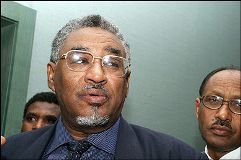Sudan says no Darfur self-rule, questions rebel talks
By Opheera McDoom
KHARTOUM, Oct 4 (Reuters) – Sudan on Monday ruled out any notion of self-rule for Darfur and said rebels in the western region would not secure the same concessions agreed with southern rebels after two decades of war.
 Agriculture Minister Majzoub al-Khalifa [photo], head of the government’s Darfur peace talks delegation, questioned whether Khartoum would continue negotiating with one of the rebel groups in African Union-sponsored talks scheduled to resume this month in Nigeria.
Agriculture Minister Majzoub al-Khalifa [photo], head of the government’s Darfur peace talks delegation, questioned whether Khartoum would continue negotiating with one of the rebel groups in African Union-sponsored talks scheduled to resume this month in Nigeria.
“There will be no question about power-sharing or wealth-sharing,” he said, referring to demands made by rebels.
He added the government would likely establish a special fund for developing Darfur, blighted by a humanitarian crisis the United Nations has called the world’s worst.
“There will never be a self-government for Darfur,” he added.
Darfur rebels took up arms against Khartoum in February 2003, saying the government had neglected and marginalised the impoverished region.
They accuse the government of arming mounted Arab militias, known as Janjaweed, to loot and burn non-Arab villages in a campaign of ethnic cleansing. Arab nomads and mostly non-Arab farmers have fought over resources for years in arid Darfur.
Khalifa said one of the Darfur rebel groups, the Justice and Equality Movement (JEM), was closely involved in a failed coup attempt last month and questioned whether the government should negotiate with a group intent on toppling it by force.
“JEM was so closely related to the coup attempt that the question is can the AU (African Union) accept for JEM to be part and parcel of the negotiations given their involvement in this?” He said, however, that there was no official decision not to continue talks with JEM.
Islamist Hassan al-Turabi’s opposition Popular Congress party was blamed for the coup attempt on Sept. 24 and government officials say JEM is the military wing of the party, suspended in April after a similar attempt to sabotage the government.
Since the rebellion started last year, more than 1.5 million people have been driven from their homes and an up to 50,000 killed by violence, hunger or disease, the United Nations says.
Khalifa said the political solution in the Nigerian capital Abuja would be for Darfur rebels to accept peace protocols signed between Khartoum and a southern rebel groups in the Kenyan town of Naivasha earlier this year to solve a separate, 21-year civil war in the south.
He said Darfur rebels could not expect the same kind of agreements but said the Naivasha accord would give Darfur, like all of the northern 16 states of Sudan, an enhanced federal status.
The Naivasha agreement includes power and wealth-sharing for the southern states, and a referendum on secession after an interim period of six years. It also provides for democratic elections throughout Sudan halfway through the interim period.
